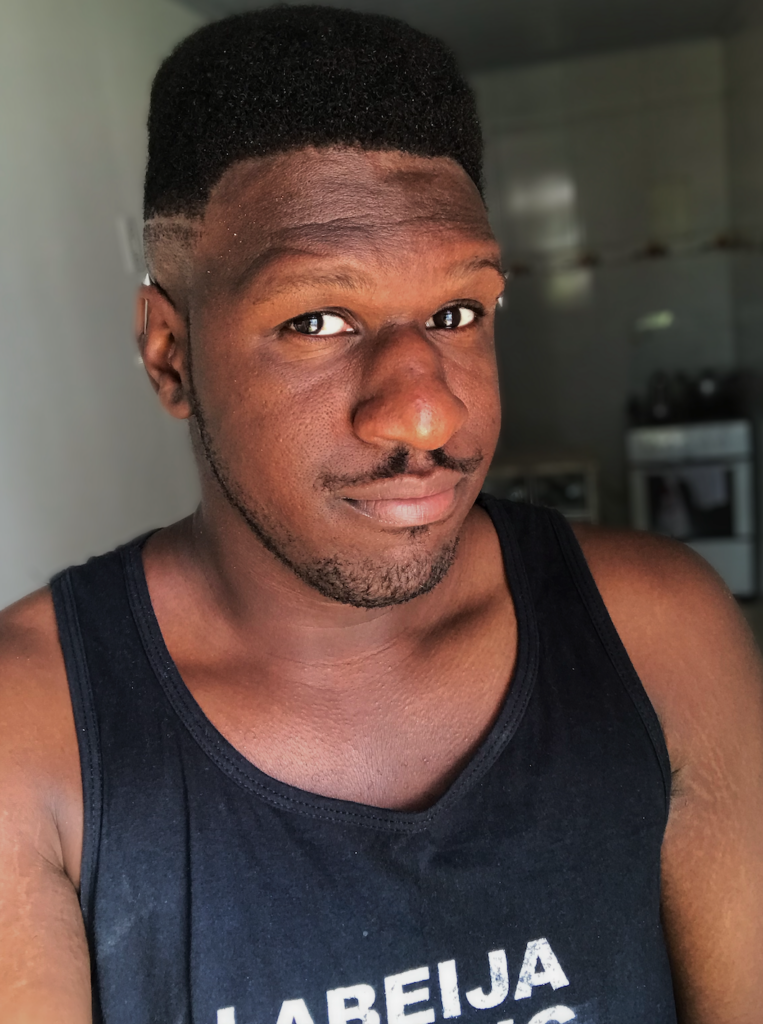by Joshua Reason
“We believe it is our right and responsibility to write ourselves into the future.”
–Walidah Imarisha & adrienne maree brown

The words quoted above were projected on a screen as the audience gathered for siri gurudev’s play, The Future of Ismael, which ran for three weeks in November 2019, at the Dougherty Arts Center in South Austin. The play is an interstellar rendering of a not-so-distant future in which queer and trans people of color are under threat. For performers and audience, The Future of Ismael is a form of care work for those struggling to survive in a world where their names, gender presentations, and other manifestations of identity are considered acts of social and political subversion.
gurudev describes the play, an adaptation of their novel by the same name, as “experimental sci-fi featuring queer people of color in a dystopian world where community, love and rebellion allow trans post-humans to thrive.” The cast and crew, which consisted primarily of queer and trans people of color, represented a mixture of Austin community members, LGBTQ Studies affiliates, and others associated with The University of Texas at Austin. The performance took place in a sizable black box theater that, alongside the minimalist set, transported the audience to a time and space beyond the here and now. The futuristic soundscape, vibrant lighting, and sensual choreography all bolstered this journey into a world where the struggle for queer and trans liberation is a literal battleground, and respite can only be found through radical practices in intimacy, community building, and organized resistance.
Director kt shorb set the tone in a pre-show talk that invited audience members to make themselves comfortable on floor cushions positioned in front of the stage. Shorb reminded us to be sure to ask for consent during moments in the play where we would be invited to interact with one another. “Cushions and consent” was the first of the play’s many references to the contemporary policing of gender and sexuality. The Future of Ismael calls attention to the hard work it takes to create and sustain queer and trans people of color communities. gurudev effectively identifies the university, the bar, and healing spaces as locations in which queer and trans people of color are (un)made and transformed by radical practices in interconnection.
Throughout the play, the cast of characters work through harrowing personal, collective, and societal anxieties surrounding gender identity and expression. Even those who seem more resolute in their identities, like Nadhi Lamar, a charismatic revolutionary portrayed by Tuyên Thái, find themselves grappling with the gender anxieties of those around them, particularly the ones they love. After a stressful moment in which Ismael, the socially awkward protagonist depicted by Elián Sweeten, leaves a sex party that Nadhi brought him to, he makes a poignant statement as silhouettes depicting the intimacy continue in the background: “I wish no one’s bodies were visible or palpable.” Invisibility, transfiguration, and transformation all serve as metonymies for the diverse practices in transition that trans and non-binary people endure to exist authentically in the world.
LGBTQ Studies Faculty Affiliate and media studies scholar Dr. Curran Nault compared The Future of Ismael to a 1983 feminist cinema classic. “The Future of Ismael reminded me of Born in Flames,” he remarked recently, “in that both envision a disheartening dystopic future in which a radically trans/queer/feminist/of color existence is still a ‘dream deferred.’ It takes us on a journey into the future, but one that brings our thoughts back to the pressing political problems of our present.”
The Future of Ismael reminds us that the future is now. The science fiction elements of the play are a meditation on the possibilities of self-actualization for queer and trans people of color, as well as a warning for what is to come if gender and sexual diversity remain under threat. The play ends with Nahdi saving Ismael from execution, suggesting that our practices in furtivity, refusal, revolt, and unconditional love pose a hope for our future. gurudev, along with their cast and crew, assembles a portrait of queer and trans people of color community that honors our practices in self-care, grapples with the angst of gender dysphoria, and envisions a future in which gender and sexuality can be limitless.

Joshua Reason (they/them) is a graduate of the Teresa Lozano Long Institute of Latin American Studies at the University of Texas. Their research is interdisciplinary in nature, drawing principally from anthropology, geography, performance studies, queer studies, trans studies and Africana studies. Their thesis project is a geographic performance ethnography that analyzes the past, present, and future of Black LGBTQ life in Salvador da Bahia, Brazil.
